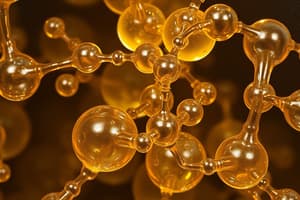Podcast
Questions and Answers
Why do insulating materials, like those containing expanded polystyrene, require less energy input to reach their maximum temperature?
Why do insulating materials, like those containing expanded polystyrene, require less energy input to reach their maximum temperature?
- Because they have a higher specific heat capacity than metals.
- Because they have a lower thermal conductivity than metals.
- Because they have a lower specific heat capacity than metals. (correct)
- Because they have a higher thermal conductivity than metals.
What role do the thermal properties of polymers, including specific heat capacities, play in selecting materials for various applications?
What role do the thermal properties of polymers, including specific heat capacities, play in selecting materials for various applications?
- They have no impact on material selection.
- They affect the color and texture of the material.
- They are important for determining chemical compatibility only.
- They influence the ability of the material to store and release energy. (correct)
What type of polymers are required for applications involving high heat transfer rates, particularly in thermal management systems for electronics?
What type of polymers are required for applications involving high heat transfer rates, particularly in thermal management systems for electronics?
- Polymers with high thermal conductivities and good thermomechanical stability. (correct)
- Polymers with low thermomechanical stability.
- Polymers with high specific heat capacities.
- Polymers with low thermal conductivities.
How do the chain segments in polyethylene differ from those in other materials like metals in terms of mobility and vibration when heated?
How do the chain segments in polyethylene differ from those in other materials like metals in terms of mobility and vibration when heated?
Why are specialized polymers with high thermal conductivities needed for managing heat generated by electronic devices?
Why are specialized polymers with high thermal conductivities needed for managing heat generated by electronic devices?
Study Notes
Polymers and Heat Capacity
Polymers are large organic compounds made up of repeating units called monomers connected by chemical bonds. These materials have various applications including plastics, fibers, coatings, and biomedical materials due to their unique properties such as strength, flexibility, and insulation.
Thermal Properties of Polymers
Thermal properties of polymers refer to their behavior when exposed to changes in temperature. Some of the key thermal properties include glass transition temperature (Tg), melting point, specific heat capacity, coefficient of expansion, and thermal conductivity.
Specific Heat Capacity
Specific heat capacity is the amount of energy required to raise the temperature of one unit mass of a substance by one degree Celsius. It is an important property for understanding how materials respond to changes in their environment.
In polymers, the specific heat capacity typically increases with increasing molecular weight due to the increase in the number of bonds that need to be broken or stretched to change the temperature. However, this relationship is not always linear as other factors such as the polymer structure, composition, and crosslinking can also influence the specific heat capacity.
For example, polyethylene, which has a low density and unbranched long chains, exhibits lower thermal conductivity compared to branched polyesters with similar chain lengths but higher degrees of branching. This difference is because in polyethylene, the chain segments are less mobile and vibrate more slowly, requiring less energy from external sources to cause them to vibrate faster when heated.
Applications of Polymers in Thermal Management
Polymers are widely used in various applications related to thermal management, including insulation, solar energy conversion, and advanced coatings. The choice of polymer depends on its thermal properties, especially the specific heat capacity, which influences its ability to store and release energy.
Insulating materials, like those containing expanded polystyrene, have a lower specific heat capacity compared to many metals. They require less energy input to reach their maximum temperature, making them suitable for insulation purposes where rapid absorption and dissipation of heat needs to be minimized.
In contrast, specialized polymers are required for applications involving high heat transfer rates, such as in thermal management systems for electronics. These polymers often exhibit high thermal conductivities and good thermomechanical stability, allowing them to effectively manage heat generated by electronic devices without degradation over time.
Conclusion
Understanding the thermal properties of polymers, particularly their specific heat capacities, plays a crucial role in selecting appropriate materials for various applications. By considering these properties alongside other factors like mechanical strength and processability, engineers can design effective solutions for thermal management challenges across diverse industries.
Studying That Suits You
Use AI to generate personalized quizzes and flashcards to suit your learning preferences.
Description
Test your knowledge on the thermal properties of polymers, including specific heat capacity and its relation to molecular weight, structure, and composition. Explore the applications of polymers in thermal management for insulation, solar energy conversion, and electronics.




